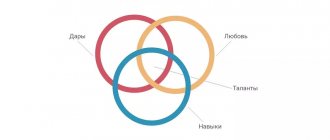When writing your resume, you should pay special attention to your professional qualities. It is by them that the employer will judge whether you are suitable for the company or not. Accordingly, professional qualities for a resume need to be selected and listed very carefully in order to attract the recruiter who will communicate with you at the interview.
- Example of professional qualities for a manager's resume
Professional qualities for a resume
Professional qualities - this is how one can characterize the totality of personal qualities, as well as all the skills that a person managed to acquire during his professional activity.
They can help you improve in the future and bring tangible benefits to your company. Sometimes there are qualities that can be called professional only conditionally. For example, if an applicant describes a “developed sense of humor” as one of them, they are unlikely to attract the recruiter’s attention. Unless a person is looking for a job as a party host - then the sense of humor can still be called professional.
How to get an effective resume with a favorable description of your professional qualities?
We offer professional assistance to job seekers who want to take their job search seriously and get quality results.
We recommend ordering a resume in Russian or English. Our specialists will help you create a truly competitive resume with the right accents.
Strong professional qualities for a resume
- desire for professional growth;
- ability to persuade;
- increased performance;
- analytical thinking.
All this will allow the recruiter to get his bearings and understand how to communicate with you and what qualities of yours to best try to reveal during an interview.
For example, the same lack of experience can be complemented by such qualities as result orientation and quick learning. Thus, the employer, realizing that one cannot expect instant results from a new employee, still gets the opportunity to create from him exactly the kind of specialist that is required. If your future employer is forward-thinking, you have a good chance.
What's better to hide
It is better not to display such aspects of character as greed, selfishness, rudeness and any other qualities that are related to undesirable factors. For example, you should not indicate weaknesses in the position of an engineer such as inattention or absent-mindedness. An engineer must be as focused and attentive as possible; these are the basic conditions.
Non-standard listing of qualities
You can communicate your willingness to do a lot to get a specific job, but not indicate your willingness to do everything. The manager must see that the person wants to develop and learn for the sake of the position. But in no case should he see the ability to deceive, evade others.
Examples of professional qualities in a resume
It must be remembered that when listing any of the professional qualities, you need to coordinate this list with the requirements for the position. For example, accuracy can hardly be considered a professional quality and defining criteria for a candidate applying for a top manager position. But it can turn out to be a very tangible advantage for the position of secretary. Therefore, when choosing professional qualities for your resume, consider how relevant one or another of them will be for you in a future position.
Here are a few situations related to certain professions that require certain specific qualities.
Example of professional qualities for a manager's resume
- responsibility;
- performance;
- ability to negotiate;
- enterprise;
- ability to make quick decisions.
Example of professional qualities for an accountant resume
- diligence;
- accuracy;
- punctuality;
- organization.
Example of professional qualities for a sales manager resume
- the ability to find a common language with people;
- public speaking skills;
- ability to quickly navigate a situation;
- creativity.
As you can see, the difference in professional qualities is obvious. It all depends on what vacancy you intend to apply for. But do not forget that the list of qualities should not be too long. If it contains about 10 points (or even more), then there is a high probability that your resume will be put aside: after all, the recruiter will get the feeling that you are simply praising yourself. Show moderation and the recruiter will appreciate your professional qualities in your resume.
Assessment of positive qualities
Positive professional qualities for a resume are also an important criterion when selecting employees. There are skills and traits that will suit any job. Their examples:
- honesty;
- simplicity and ease of learning;
- the ability to concentrate on what is important;
- stress resistance;
- absence of bad habits;
- initiative, etc.
Such qualities are valued in an employee in any position, because... characterize him from the best side. If an applicant is submitting a resume for a management position, it is better to indicate other personal characteristics.
HR managers and experts identify 3 categories of strengths:
- Mobile skills. Abilities inherent in related professions or those that were used by the candidate at his previous place of work and will be relevant for the vacant position. These could be the skills to establish contact with people of different temperaments, work with basic office programs, quickly resolve urgent issues, or remain calm in stressful situations.
- Skills that are based on knowledge. A person acquired such abilities through additional training or during work at his previous place of work. This is the ability to use a computer, keep records, conduct business correspondence with foreign partners, communicate fluently in a foreign language, etc.
- Personal qualities. Unique human properties. They allow you to understand what a potential employee is like in everyday life.
Often, applicants first write positive qualities that are directly related to work activities. But there is no need to praise yourself too much. A little self-criticism won't hurt.
A potential employee can confirm the presence of the listed characteristics using arguments. You can give examples of the manifestation of such abilities in the motivation sheet in the form of a structured and logical text.
When creating a business aptitude shortlist, consider what personality traits or professional skills the ideal candidate would have.
What does an employer need?
The qualities of an ideal worker are determined by the labor organizer. This is the owner of the company or other person responsible for recruiting personnel. Both the business and personal qualities of the applicant are important to him. An employee’s business qualities are the ability to perform tasks assigned to him by his superiors in a high-quality and timely manner. This is possible if you have the appropriate education and work experience in the same field. The manager must understand whether the new employee will be useful to the enterprise.
Assessing the personal qualities of applicants for a vacant position is another task for a manager. It is important that the newcomer is able to prove himself and become part of a friendly team. Given the similarity of the business characteristics of the applicants, it is difficult to make a choice. A correct assessment of personal merits will allow you to select the best candidate.
Professional quality
When hiring a person, a person’s professional qualities are assessed. The manager needs to know whether the employee can perform his tasks. Which of them are most in demand:
- education, specialty;
- quick adaptation to new working conditions or quick learning;
- willingness to work overtime;
- professional integrity;
- customer interaction skills;
- skill to work in team.
Positive properties may relate to a certain mindset, external data or physical form. There are many options. Managers have different preferences for employee characteristics. It depends on the characteristics of the profession and the personal wishes of the manager.
Personal characteristics
The personal characteristics of the applicant can compensate for his professional shortcomings. Labor skills will not help solve problems or conflicts in a team. Therefore, the following are taken into account:
- discipline;
- politeness;
- communication skills;
- persistence;
- tact;
- stress resistance.
Employees are also valued: enthusiasm, energy, dedication, punctuality and hard work.
Lack of communication skills does not play into the hands of the employee
Professional and personal: the difference
Job seekers often confuse professional skills and personal qualities. There is a very fine line between the two concepts. Business qualities characterize a person as a workforce. The most important are the level of education and work experience. Both factors will help the employer assess possible labor productivity, competence, and professional skills.
When considering business qualities, it is important for the recruiter to understand whether the applicant will be suitable for the vacant position. He analyzes whether the candidate will help achieve the desired goals, what value he brings to the company and what his salary may be.
Features of personal qualities indicated in the resume:
- characterize a person as a person;
- taken into account when several candidates have business skills at the same level;
- help in forming an opinion about the candidate’s attitude towards work, colleagues, superiors, etc.
Personal characteristics are secondary and are not always taken into account, but they still need to be written about carefully.
Important: what factors influence the choice of profession?
Influence of the profession
Labor activity requires a person to have certain professional skills. To simplify the process of finding a new employee, it is important to narrow the pool of applicants for a vacant position. To do this, you must indicate certain characteristics in your job advertisement:
- For the service sector: communication skills, ability to work with clients, politeness, courtesy, flexibility of thinking, etc.
- For entertainment and promotion: teamwork, communication skills, ability to interest people, charm and energy.
- For office vacancies (accountants, system administrators, etc.): mathematical mindset, attentiveness, organization, ability to work with large amounts of information.
There are universal characteristics. Employers always value attentiveness, dedication, and stress resistance. Job seekers know this and put these qualities on their resumes. This will not help you get a job. The employer needs information about the applicant's specific skills.
Professionalism and excellent knowledge in the field of the enterprise do not make a person the best among candidates for a position. There are qualities that may be more important: attentiveness, hard work and a pleasant appearance in the service industry are critical.
For office workers, these qualities are not so important. The list of requirements for a candidate for a position depends on the specifics of the job. Therefore, it is important to consider competitors comprehensively: their professional skills, personal qualities and lifestyle.
>Personal and business qualities of the employee
Writing examples
Let's look at an example of professional skills for a PR manager resume:
- experience in PR promotion (more than 8 years of work, there are connections in major media);
- knowledge of advertising and promotion on the Internet (experience in developing Internet projects from scratch);
- experience in negotiations and sales skills (more than 8 years);
- high level of PC skills;
- I can explain simply (set tasks, make presentations, teach);
- I speak in public easily.
Let us repeat: in addition to the general ones, suitable for most potential vacancies, there are also specific, additional skills; For a resume, a combination of both is important.
Use our table when preparing a self-presentation while looking for a job.
Examples of professional skills and knowledge in a resume:
| Leadership skills for managers | |
| Manager |
|
| Manager |
|
| Director |
|
| Head of Sales Department |
|
| Key skills for administrators and secretaries | |
| Administrator |
|
| Secretary |
|
| Key skills and abilities for sellers, consultants | |
| Consultant |
|
| Salesman-cashier |
|
| Key skills and abilities for teachers leading seminars and trainings | |
| Teacher |
|
| Presenter at seminars and trainings |
|
| Key skills and abilities for technical specialists: programmers, system administrators | |
| Programmer |
|
| System Administrator |
|
| Key skills and abilities for accountants, auditors | |
| Accountant |
|
| Auditor |
|
| Key skills and abilities - examples for lawyers | |
| Lawyer |
|
| Key skills and abilities for a resume, example for an HR director | |
| HR Director |
|
| Key skills for drivers | |
| Driver |
|
IMPORTANT!
Don’t be tempted to find and copy a ready-made template; be sure to rework the application to suit you and the specific vacancy. That among them there are relatively universal ones is an illusion. Finding a standard sample (as an example) of what key skills to include in a manager’s resume and rewriting them for an administrator, sales representative or salesperson is not an option. Of course, the administrator is not a criminal lawyer or a neurosurgeon, but he is not a sales consultant either. Plus, impersonal, many times copied questionnaires are more likely to end up in the trash before being read.
Example of a completed resume:
Business and personal qualities
An employee’s business qualities are his ability to perform certain job duties. The most important of them are the level of education and work experience. When choosing an employee, focus on the benefits he can bring to your company.
Personal qualities characterize an employee as a person. They become important when applicants for one position have the same level of business qualities. Personal qualities characterize an employee’s attitude towards work. Focus on independence: he should not do your work, but must cope with his own to the fullest.
| Business qualities | Personal qualities |
| The level of education | Accuracy |
| Specialty, qualification | Activity |
| Work experience, positions held | Ambition |
| Labor productivity | Non-conflict |
| Analytic skills | Fast reaction |
| Quick adaptation to new information systems | Politeness |
| Fast learner | Attentiveness |
| Attention to detail | Discipline |
| Flexibility of thinking | Initiative |
| Willingness to work overtime | Performance |
| Literacy | Communication skills |
| Mathematical thinking | Maximalism |
| Customer interaction skills | Perseverance |
| Business communication skills | Resourcefulness |
| Planning skills | Charm |
| Report preparation skills | Organization |
| Oratorical skills | Responsible approach to work |
| Organizational skills | Decency |
| Enterprise | Devotion |
| Professional Integrity | Integrity |
| Scrupulousness | Punctuality |
| Ability to handle multiple projects simultaneously | Determination |
| Ability to make quick decisions | Self-control |
| Ability to work with large amounts of information | Self-criticism |
| Strategic Thinking | Independence |
| Striving for self-improvement | Modesty |
| Creative thinking | Stress resistance |
| Ability to negotiate/business correspondence | Tact |
| Ability to negotiate | Patience |
| Ability to express thoughts | Demandingness |
| Ability to find a common language | Hard work |
| Ability to teach | Self confidence |
| Skill to work in team | Equilibrium |
| Ability to put people at ease | Determination |
| Ability to persuade | Honesty |
| Good appearance | Energy |
| Good diction | Enthusiasm |
| Good physical form | Ethical |
Business qualities: what to look for when selecting
An employee’s business qualities are the ability to perform job duties as specified in the job description. When choosing an employee, focus on the benefit he will bring to the organization. Take into account personal qualities - they characterize your attitude towards work.
Business and personal qualities of an employee: list
| Business qualities |
|
| Personal qualities |
|
| Important! The table lists a person's business qualities that can be used for a resume or job description. Only part of them will be enough for work. Keep in mind that a person cannot be endowed with all of them at the same time. |
A person’s business qualities directly depend on his personal ones—they are closely interrelated. When selecting a candidate for a vacant position, make a list of required and non-essential abilities and traits.
If an applicant has entered more than 5 characteristics into his resume, this means that he is not able to make a choice. The standard “punctuality”, “efficiency”, “responsibility” have become banal, so ask what the employee means by them.
Pay attention to such business qualities of the employee as “motivation to work”, “self-control”, “professionalism”. Job seekers often embellish skills and abilities.
To ensure the integrity of the information, ask for an illustration of the specified characteristics. Weed out people who voice contradictory qualities immediately.
If they are unable to decide on the characteristics, do not expect high performance from them.
| Business and personal qualities in a resume: example A specialist got a job in an organization, who wrote in his resume that he is distinguished by high efficiency and activity. The manager expected the employee to be willing to work overtime, but it turned out that by this he meant the ability to perform several tasks at the same time. |
Negative personal and business qualities of a manager
Ask applicants to include negative business qualities on their resumes, but don't expect honesty. Be lenient if the candidate does decide to fill out the column. Some of the negative characteristics help in work.
Negative business qualities of a person: list
- hyperactivity, restlessness;
- excessive emotionality, touchiness;
- greed, impudence;
- addiction to gossip;
- vindictiveness;
- inability to lie, straightforwardness;
- inability to work in a team;
- lack of work experience or education;
- lack of sense of humor;
- bad habits;
- self-confidence;
- modesty, shyness;
- poor communication skills, conflict.
An applicant who has entered negative business qualities of a person is honest and rash at the same time. If you want to know possible problems with it, ask to list them and give examples of when they appeared. Give the person the opportunity to present negative traits in a favorable light, listen to him. They often help with work and career advancement.
Projective questions for assessing an applicant for the position of head of the event organization department
Professional and business qualities of workers in various fields
Be careful when assessing an employee’s professional and business qualities. Don’t hire the first person you come across to fill the vacancy faster. You should believe the information in your resume, but it should be verified.
Required qualities:
- For employees in the field of promotion: communication skills, sociability, ability to work in a team, charm, energy, self-confidence.
- In the field of trade: skills of interaction with clients, flexibility of thinking, ability to negotiate, quick response, politeness, activity.
- Personal and business qualities of a leader: organizational skills, ability to find a common language and work in a team, lack of conflict, resourcefulness. Charm, quick decision-making, attentiveness, and balance are valued.
- Strengths of a specialist working with large volumes of data: attention to detail, quick learner, accuracy, organization.
- Professional, personal and business qualities of secretaries: business communication skills and interaction with clients, literacy, negotiation skills, business correspondence, the ability to perform several tasks at the same time. External data, tact, and balance are important.
Responsibility, stress resistance and attentiveness are useful in any field of activity. But the candidate, when writing these qualities into his resume, does not always take them seriously. Some people don't understand what they mean. They notice who is wearing what, but they lose sight of important nuances in work, do not respond to criticism, and confuse responsibility with performance.
Negative qualities of an employee
Sometimes job applicants also include them in their resume. In particular such as:
- Hyperactivity.
- Excessive emotionality.
- Greed.
- Vengefulness.
- Impudence.
- Inability to lie.
- Inability to work in a team.
- Restlessness.
- Touchiness.
- Lack of work experience/education.
- Lack of a sense of humor.
- Bad habits.
- Addiction to gossip.
- Straightforwardness.
- Self-confidence.
- Modesty.
- Poor communication skills.
- The desire to create conflict.
An applicant who includes negative qualities in his resume may be honest, or he may be reckless. Such an action does not justify itself, but if you want to know possible problems with this applicant, ask him to list his negative qualities. Be prepared to give the person the opportunity to rehabilitate himself and present negative qualities in a favorable light. For example, restlessness indicates easy adaptation and quick switching from one task to another, and straightforwardness indicates the benefits that it can bring when concluding a deal.
Be prepared to give the person the opportunity to rehabilitate himself and present negative qualities in a favorable light.
Writing a resume online
There are dozens and hundreds of candidates vying for one position, so it’s important to stand out. At this stage, it is impossible to attract attention to yourself with personal charm. Therefore, in order to write your professional skills in a non-standard and correct way, you should use original services for writing a resume online:
- ready-made resume from the leader of domestic hunting
- Visualize. The list of previous jobs, skills and merits is converted into infographics. To create it, you need a LinkedIn profile. Data can be taken from Facebook and Twitter. You can make infographics using Re, Kinza services. They differ stylistically, so the design is chosen according to individual taste;
- Pathbrite. The service is ideal for people with no work experience. It allows you to combine the history of a person’s development as a promising specialist: diplomas, certificates of completion of courses, essays;
- Zerply. This social network has received high praise among developers and designers, as it will be possible to publish a portfolio there;
- CVmaker. The service is suitable for creating a standard, but stylish resume. It provides six free templates designed in a classic style.
Each profession has its own skills, which must be taken into account. After compiling your resume, you should imagine yourself as a manager who needs an employee for your position. Changes should be made until you are satisfied with the result. You don't need to make a very long list, otherwise your resume will be put aside.
Qualities for different professions
Certain professional qualities are needed in almost all types of activities. You can make it easier for applicants and at the same time narrow their circle by including information about the required characteristics in the job advertisement. For an employee in the field of promotion or entertainment, the main qualities are communication skills, the ability to work in a team, and to win people over. The list of winning qualities will also include: charm, self-confidence, energy. In the field of trade, the list of the best qualities will look like this: flexibility of thinking, skills in interacting with clients, the ability to negotiate, work in a team, as well as quick response, politeness, perseverance, and activity.
A leader in any field must have such professional qualities as organizational skills, the ability to find a common language and work in a team, resourcefulness, lack of conflict, charm and the ability to teach. Equally important are the ability to make quick decisions, self-confidence, attentiveness and balance.
The strengths of an employee working with a large amount of data (accountant or system administrator): attention to detail, accuracy, quick learner, attentiveness, organization and, of course, the ability to work with a large amount of information.
The characteristics of a secretary include a variety of positive qualities: skills in interacting with clients, business communication, literacy, ability to negotiate and conduct business correspondence, and the ability to deal with several things at the same time. Also pay attention to good external characteristics, attentiveness, tact and balance, and diligence. Responsibility, attentiveness and stress resistance are useful in any profession. But the applicant, adding such qualities to his resume, does not always take them seriously.
Responsibility, attentiveness and stress resistance are useful in any profession. But the applicant, adding such qualities to his resume, does not always take them seriously.
Personal strengths in professional activities
Business or professional qualities are the ability of an individual to perform certain functions if he has the required level of knowledge, skills, experience, education and other characteristics of a person. Without knowing them, it will be difficult for a manager to assign some tasks to an employee.
Professional character traits
There are no perfect people. Each individual person is completely unique and has both strengths and weaknesses. Everyone is definitely concerned about a person’s strong qualities; they strive to recognize and develop them as much as possible. A clear knowledge of your own strengths will allow you to accurately display them in your resume and conduct an interview effectively.
Important! There is a division into business and professional qualities.
The latter reveal in sufficient detail the characteristics of the specialist’s properties. The first ones are universal qualities for different types of activities.
An example of a person's strengths, list:
- creativity;
- creative potential;
- conscientiousness;
- communication skills;
- responsibility;
- stress resistance, etc.
Character Traits in the Application
Indicating some of the listed strengths in the resume can have a good impact on the overall impression. A potential leader will understand the seriousness, high-quality approach to business, and the ability to clearly and competently express thoughts. However, caution should be exercised because overuse of positive qualities can negatively affect the overall impression.
If a person does not have certain skills in the industry, and questions on this topic are asked in the resume, then it is better to honestly answer that there are no skills in the required area yet, but there is a desire to open new areas. This will be an honest and open answer; the employer will be able to understand that there is a desire and need for development.
Note! Business and professional properties are often mixed with personal ones.
In business, skills such as endurance, discipline and the ability to control oneself in difficult situations are especially valued. During an interview, a potential employee can be tested for the presence of these qualities; for this purpose, provocations and tricky questions are used. A professional must be able to use such skills constantly when interacting with clients and colleagues.
Most likely, during the interview you will be asked to list the person’s weaknesses. At the same time, you shouldn’t panic and start seriously listing all the negative qualities that come to mind. This question is rather rhetorical and usually it is enough to indicate a couple of shortcomings, for example, shyness. This trait is not considered a major disadvantage, is quite common and does not matter much to the employer.
Description of job requirements
It is recommended to thoroughly prepare for resume writing and interviews. You should make a list of personal advantages in advance and remember it carefully. It is important that in the resume and during the conversation, the listed qualities coincide, and some new ones do not appear that are not displayed. This may raise “unnecessary” questions and causes for concern.
Assessment of employee professional qualities
To avoid wasting time and money testing new employees, companies sometimes evaluate them before hiring. There are even special personnel assessment centers created for this purpose. A list of assessment methods for those who prefer to do it themselves:
- Letters of recommendation.
- Tests. These include routine aptitude and aptitude tests, as well as personality and biographical tests.
- Interview.
- An exam on the knowledge and skills of an employee.
- Role play or cases.
Role-playing will help you find out in practice whether the applicant is suitable for you. Simulate an everyday situation for his position and see how he copes. For example, evaluate his customer interaction skills. Let the buyer be your competent employee or yourself, and the applicant will show what he is capable of. You can set a goal for him to achieve during the game, or simply observe his working style. This method will tell you much more about the applicant than the “Personal Qualities” column on a resume.
When deciding on evaluation criteria, you can base your assessment on business qualities: punctuality, potential quantity and quality of work performed, experience and education, skills, etc. For greater efficiency, focus on the qualities required for the position for which the candidate being assessed is applying. To be confident in an employee, consider his personal qualities. You can conduct an assessment yourself in the form of a ranking of candidates, placing + and – according to certain criteria, distributing them by level or awarding points. Avoid assessment pitfalls such as bias or stereotyping, or placing too much weight on one criterion.
Universal personal qualities for resumes, positive and negative for men and women
Universal personal qualities for a resume
If you realize that you do not have any outstanding abilities, you can always indicate in your resume universal qualities that are suitable for all professions. This little trick will help you form the right opinion about yourself, and it is likely that the employer will not begin to focus on any specific professional qualities. And remember that your resume should contain qualities that are more suitable than others for the position you want to get.
After all, if you get a job as a loader, but at the same time indicate that you have good charisma, then this will only make the person who reads it laugh. If you describe yourself in just a few words, the employer will have a clear idea of what to expect from you. As practice shows, employers simply refuse to read resumes that contain 2 pages of information about how good a person is and immediately cross such individuals off the list of applicants for the position.
Positive qualities for a resume, for men and women:
- Learning ability (you can indicate that you are ready to attend additional courses and trainings)
- Ability to work overtime (including weekends)
- Complete absence of bad habits (this means that you generally do not smoke or drink alcohol)
- Stress resistance (you are not afraid of any difficulties)
- Hard work (willingness to give your all for the sake of a common cause)
Negative qualities for a resume, for men and women:
- Directness (you prefer to tell a person everything you think about him)
- Scrupulousness (you don’t like to do work quickly because you think it worsens the result)
- Demanding (always expect more from people)
- Pedantry (always meticulously follow some rules)
- Self-esteem (you think that in some cases you are head and shoulders above others)
Business qualities of employees: what is their list?
What might an employee’s business qualities be, a list that should be followed? The list of them is of course large and varied. Currently, it is up to the employer to evaluate the actions of any employee, his level of professionalism, strengths and business qualities. This becomes a perfect task, helping to form an efficient team and significantly increase labor efficiency. But from the side of the employee himself, their list helps not only to create a competent resume sent when looking for a job, but also increases the chances of other potential applicants in the employment process.
The personal qualities of employees can be divided into 2 large categories: personal, which are initially innate and develop during the development stages of the person himself, and professional, which are acquired in the process of work and come with experience. A skillful combination of both, and constant work on oneself, provide a unique opportunity for career growth and good management. Let's look at these categories in more detail.
Strengths and weaknesses relative to the position
Each position has its own set of personality aspects that the employer pays attention to. It is very important to strike the balance that will make you the ideal candidate for the position.
Tables of strengths and weaknesses for each profession:
| Strong | Weak |
| Salesman | |
|
|
| Supervisor | |
|
|
| Manager | |
|
|
| Accountant | |
|
|
Read more - What can you write about strengths in your resume?
Professional qualities of the employee
Of course, in its standard understanding, this list can be huge, and the criteria that a manager uses when assessing a particular employee can differ significantly depending on the positions held, the functionality assigned to the employees, and the tasks assigned to them.
But let’s try to collect their frequently occurring positions into a single list.
- Self confidence. This is an acquired quality that gives a clear awareness of the impeccable performance of one’s functions and a kind of basis for further decision-making.
- Excellent knowledge of the features and technology of work, ways to improve it. It is developed with incoming experience and thanks to one’s own interest in the relevance of production changes.
- The ability to choose the right means and real methods for achieving the best results.
- Creativity. Defining an updated approach to an established production process and the opportunity to look at it from a different, non-standard perspective.
- Stress resistance. This is the ability to show restraint in one’s own reaction in relation to the situation or actions of employees.
- Planning your own work process in relation to efficiency and combining it with the work of the entire team.
- Emotional balance. Lack of a strong reaction to what is happening and regular maintenance of calm in conflict issues. It is developed over time in the stability of emerging situations.
- The desire to win. Regular desire to achieve the best performance in relation to other employees occupying the same positions in the organization.
- Distribution of powers and responsibilities. The ability to determine the priority of assigned tasks and delegate some powers to the team with their subsequent control.
- Clear and tough solutions to operational issues. In the process of well-established work, non-standard situations arise that require timely identification and resolution, and here only actual actions are necessary.
- Strictness and fairness towards one’s own actions and those of others. Abilities that enable you to evaluate work results.
- Organization of personnel work. The ability to professionally organize the process of activity so that each employee clearly understands their tasks and strives for their effective implementation.
Examples
For girls
As already mentioned, the presence of certain qualities largely depends on the position for which the applicant is applying.
For girls, modesty is first and foremost important.
Creative teams may pay attention to individual clothing styles. In the business world, it is preferable to wear formal clothing with a minimum of decoration and bright elements.
Girls are expected to have diligence and communication skills
It is important to be able to present yourself correctly in a team, not to separate from it and to find a common language with the majority of its members.
Girls most often work as salespeople. Due to their developed communication skills, friendliness and charm, it is easier for them to find a common language with customers.
If the girl is a representative of the pedagogical specialty, then patience, love for children, interest in teaching and special knowledge are required. Experience is not always important, but the desire to work and develop in a specific position does.
In terms of leadership qualities, girls are subject to fewer requirements than the stronger sex. The exception is leadership positions, as well as specialties related to training and coaching.
Thus, the list of main characteristics for women looks like this:
- punctuality;
- perseverance;
- communication skills;
- friendliness.
However, it cannot be said that there are only male characteristics and only female ones; in many respects everything depends on the position.
For a man
Men, as a rule, enter more responsible positions.
For construction and engineering professions, the following characteristics are important:
- attentiveness;
- responsibility;
- good physical fitness;
- work experience and education.
It would be useful to have leadership qualities. The absence of bad habits is also taken into account.
For the manager
The success of the company and the cohesion of the team largely depend on the leader. Therefore, selection for serious positions is carried out most carefully.
It looks how easily and quickly the applicant builds communication. Does he have any fears or self-doubt? These qualities are an obstacle to entering a leadership position.
A leader must be demanding, but at the same time be able to show gentleness and concessions in some moments in order to achieve certain goals and effectively manage the team.
A despot leader will keep the staff in fear, but at the same time fear will become an obstacle to high achievements and affects staff turnover. A director who is too soft will also not be able to effectively manage staff and monitor their activities.
For high positions, it is important to have a high level of energy, since the work requires a lot of dedication and is associated with constant movement and stress.
An important property is independence. Senior managers have to rely on themselves to make decisions
He must be able to take responsibility for his actions, not doubt his choice and set an example for other employees on how to act.
A non-independent leader will try to shift responsibility to subordinates or higher-ranking managers, which will ultimately lead to loss of money and ineffective work.
Thus, the ability to correctly compose a resume and include the necessary professional and personal characteristics in it is an important quality of an applicant. How to write a good resume:
How to write a good resume:
Our interesting VKontakte group:
Personal qualities of employees
These are aspects of human life that are formed individually, developing every year. They affect not only relationships in the family, everyday life and friendly contacts, but also work processes.
- Skill to work in team. Of course, this is very important when the team, as a whole, is determined to achieve results, to organize its work without conflicts and in a pleasant positive way with the rest of the employees.
- Justice and honesty. This is the key to the right attitude and the opportunity to demand the same attitude towards yourself.
- The ability to listen to other people’s opinions, accept advice and recommendations. You need to understand that the decision made may not always be the only true and correct one, and an outside perspective is sometimes able to most effectively assess the situation. It is important to simply accept such help.
- Adequate perception of criticism from outside. Do not think that the criticizing person is completely negative towards you. Perhaps this is simply a method to show real performance results and improve their level. Such criticism mostly brings positive results.
- Ability to defend your decisions and interests. In industrial disputes, based on evidence and facts, it is important to correctly convey performance indicators
- Integrity. This is a quality that helps you defend your own point of view.
- The ability to keep your word. This position convinces of responsibility and the opportunity to rely on your candidacy, confirming once again that you are a good employee.
- Showing tact. This is the ability with which it is possible to build better relationships in a team.
- Determination and perseverance. Such innate qualities allow you to defend your own position and convince management of the correctness of your decisions.
The assessment of the business qualities of employees for the first time occurs when hiring. It is here, during the interview process, that the head of the organization considers your candidacy positionally, mentally applying these qualities in relation to the future functionality of the job. And a little later, by conducting regular certifications, it helps to assess the suitability of abilities for the position held. During the assessment process, a number of other main tasks are solved:
- the most relevant place in the organizational structure is determined for more effective use of the strengths of the future employee;
- if necessary, develops an individual development program for employees;
- ways of possible motivation are determined;
- The satisfaction of personnel from their duties is considered.
On the one hand, such a process helps to actively collect all the necessary information to study the employee’s level of professionalism and the possible organization of his training, and on the other hand, it increases his motivation and develops the basis for future material incentives.
Kindness is one of the best character traits
From childhood, a child is taught to be kind, to love animals, to help people, and to do only positive deeds. There are a countless number of sayings and proverbs about kindness; children learn them at school. Our ancestors came up with proverbs in order to make the world a better place. Unfortunately, not everyone has this best trait, one of the most successful for a happy life. A good-natured person is ready to help unselfishly, does not wish harm, and has no envy in him. This can be cultivated in oneself if a person feels that he is envious, demanding, he definitely needs to work on himself, eradicate negative traits and instill better, positive ones.
The word comes from “good”, which means good. Hence the understanding that a good-natured person brings good and helps others. Such people are kind to everyone, take care of the elderly, children, the needy, and have a better attitude towards the world. Mandatory companions of kindness:
- responsiveness;
- unselfishness;
- consideration for others;
- goodwill;
- friendliness.
Those around you will definitely appreciate such a disposition towards you, will help you in return, and will appreciate you better. People who are not characterized by kindness mistakenly believe that it is better to think only about themselves, that there are no responsive, grateful people around who will reciprocate. Very often an evil person simply made a mistake, got burned and lost trust in people. All this can be corrected by showing your neighbor your positive attitude, accompanied by the above-mentioned best manners.
Choice of qualities
If more than 5 characteristics are included in the resume, this is a signal that the applicant is not able to make an intelligent choice. Moreover, the standard “responsibility” and “punctuality” have become banal, so if possible, ask what these general concepts mean. A striking example: the phrase “high performance” could mean “ability to work with a lot of information”, while you were counting on “willingness to work overtime.”
Such general concepts as “motivation to work”, “professionalism”, “self-control” can be explained by the applicant in other expressions, more specifically and meaningfully. Pay attention to incompatible qualities. To make sure that the applicant is honest, you can ask him to illustrate the characteristics he specified with examples.
Exercises to identify strengths and weaknesses
Identifying personality characteristics is never an easy task. Therefore, it is necessary to carefully weigh all the strengths and weaknesses at the stage of preparing a resume, then this information will be useful for the interview. First make a list of them as follows:
- Analyze your character traits in detail. Think about what you can do most easily and what requires effort. Write down the qualities required to complete these tasks.
- Reach out to friends and family for help. They will point out the advantages and disadvantages, because from the outside they can see better.
- Evaluate all the qualities you wrote down on the sheet. Sort them according to the principle of advantage - disadvantage. For example, you prepared for a presentation, selected all the material, designed it, but were unable to speak. On the part of the performer, you approached the matter responsibly, were attentive and diligent. But from the leadership side, you cannot speak to the public.
- Identify the qualities of the applicant for the position and write them down.
- Compare your characteristics with those required for the required vacancy.
- Evaluate the result, determine your shortcomings and the ability to cope with them.
How to find out an employee's strengths?
To save time, the employer uses the following methods to evaluate a potential employee:
- Letters of recommendation from previous employers. Due to strict selection criteria, requests for recommendations are practiced in Western countries.
- Tests. It would also be a good idea for an employee to take a test to determine his suitability for his chosen profession. Employers often use such tests.
- Interview. During a personal conversation, it is assessed how socially adapted the specialist is.
- Examination of specific employee skills. Knowledge of the law for lawyers, understanding of algorithms for programmers.
- Role-playing game. In sales, it is often practiced to initiate cold calls or directly contact the buyer. It is proposed to sell a telephone or, as employers have long used it, a pen on the spot.
Natural behavior endears you to a potential employer










